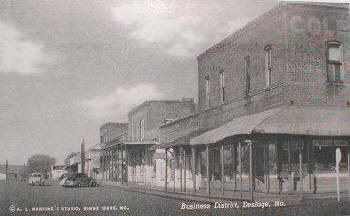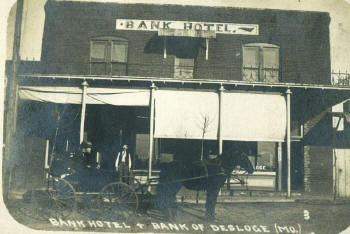|
|
In the golden days before the U.S. entered World War I, a quick turn around Main
Street in Desloge could set seasoned shoppers' blood racing with the challenge of finding
a good bargain.
 |
A thriving commerical center for the surrounding county, Desloge was chock-full of ready-to-wear retailers, grocers and general merchandisers. Thurman's, Sachs and Goff's Mercantile competed for shoppers' dollars, and in 1917, Kahn's, a clothing store, advertised at its "17th semi-annual clearing sale" women's fancy shoes at $4.95 a pair and Buster Brown shoes for the kids at $2.49 per pair.
|
That year C.E. Jones' butcher shop reminded its customers "Meat eaters have
pep," and Morris Butcher Shop countered with "Steaks when very choice and
tender, happy mealtime thoughts engender."
|
"At one time, Desloge was a really thriving town," said Carl Murphy, an 85-year-old native. "I remember when all the places along Main Street were filled."
Murphy recalls at least 42 businesses in Desloge, centered mostly along Main, Lincoln, Elm and Chestnut streets.
"That's a lot, especially for a small town," adds his wife, Mabel.
Variety was the name of the game in the city's early days. Desloge sported the usual
retailers and grocers, along with Miner's Lumber, the Desloge Motor Company, the Grand
Theater and the Home Hotel, located on North Main where the city's post office is now.
 Grand Theater, Desloge, Missouri (courtesy of Rollin Becker) |
Murphy recalls Desloge's first theater, located in the A.J. Clay Building along with several other businesses, but the building burned down around 1912. "It just went up like tinder," he said, and his wife adds the city was out of water after the fire was put out.
"The whole town was dry," she said.
Edith Welland, another native, remembers several of Desloge's other businesses. Goff's Mercantile, billed as "the oldest firm in Desloge," she said, was "where we would go to buy quite a few of our groceries." Goff's was first located on Oak Street where the VFW post now stands and later moved to the site on North Lincoln where Miner's Lumber is now located.
Kahn's, located across from the Desloge depot, she remembered, was "the leading Store. If you wanted fine clothing, that was where you went."
With all that competition to consider, Desloge merchants took a lot of time to advertise. Goff's advertised a 10-day sale in 1917 across the top of the Desloge Sun, the city's weekly. The Desloge Hardware and Furniture Company told readers, "The comfortable home is one essential to happiness in life."
The Desloge Motor Company, owned by D. Elmer Brown, former mayor, proudly represented the Hupmobile, an auto "distinguished by rich, dignified beauty, undurpassed mechanical qualities and really great performance."
Not to be outdone, the Lead Belt Motor Company offered a Ford Fordor Sedan for $660.
|
But time and history took their tolls and the boom Desloge enjoyed came to an end. A number of factors are blamed for the drop in business, including the 1917 mining riot in which local miners rounded up some 300 immigrant families, loaded them onto boxcars and shipped them off to St. Louis and Illinois.
"After the uprising, it never did pick up like before," Murphy said. The shortage of miners may have left too few customers, as did the end of World War I in 1918, when production in the mines slowed down.
In 1918, Goff's told its customers that U.S. Food Administration rules would no longer
let them carry accounts for more than two weeks, and the Bank of Desloge was advertising
War Savings Stamps and urging Americans to save more, saying "no longer can Americans
draw on the savings of Europe."
 |
After the war, a little modernization was due. Grocers were no longer open for business on Sundays and home deliveries slowed. Prices went up and the value of the dollar went down. To help a little, Eagle Stamps arrived in Desloge in 1919, first at Morris Bros. Butcher Co. and later at L. Sachs and Meadow Bros. A book of stamps was worth $2.50 in merchandise or $2 cash.
The Bouchard-Green Butcher Co. said, "If it is to eat, you'll find it at our store," and C.Z. Boyer, the local undertaker also offered "a full line of notions and school supplies."
When the Depression hit in 1929, the horizon darkened as more and more felt the economic pinch. In 1932, the end of an era in Desloge came when Goff's Mercantile and Miner's Lumber Company were destroyed in a huge blaze. Goff's never re-opened, but Miner's Lumber took over their North Lincoln site and continued to expand throughout the county. More and more smaller businesses were closed down by the economic disaster, and the city did not begin to recover until the demands of World War II lifted the country out of the Depression.
The business situation is stable now in Desloge, but those who remember the city in its heyday will testify to the effects of the Depression. "There's still quite a lot of business," Murphy said, "but nothing like it was then." The city is now mainly a residential area, but a drive down Main Street can still bring back memories of Saturday trips into town for a few yards of table linen from Goff's or a new suit from Kahn's.
|
The information on this site is provided free for the purpose of researching your genealogy. This material may be freely used by non-commercial entities, for your own research. The information contained in this site may not be copied to any other site without written "snail-mail" permission. If you wish to have a copy of a donor's material, you must have their permission. All information found on these pages is under copyright of Oklahoma Cemeteries. This is to protect any and all information donated. The original submitter or source of the information will retain their copyright. Unless otherwise stated, any donated material is given to MOGenWeb to make it available online.